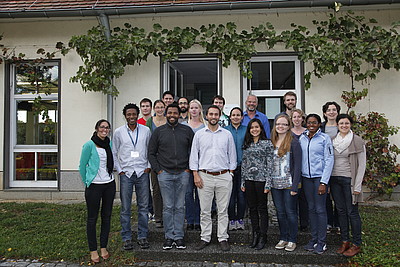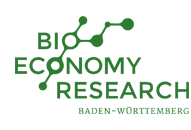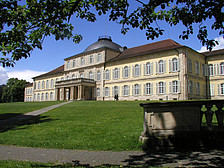Summer School Modeling the Bioeconomy

During the summer school “Modeling the Bioeconomy” from 14 to 18 September at the University of Hohenheim, 18 international young scientists discussed with experts of the competence network and external speakers how simulation models can contribute to the future development of a sustainable bioeconomy.
The summer school was organized by the Baden-Württemberg “Competence Network Modelling the Bioeconomy”, a consortium of renowned scientists from four universities and research institutions that is currently funded within the Baden-Württemberg Bioeconomy Research Program.
Biomass as a resource for the bioeconomy is limited by the availability of land. With a worldwide increase in biomass demand, competition between the production of food, feed, energy and other products will increase and important decisions are to be made about biomass use in competing value chains. Simulation models are an ideal instrument to analyze direct and indirect impacts of land use changes and therefore can provide a useful knowledge basis for such decisions, Professor Dr. Harald Grethe, the chair of the network, explained during the introduction.
During the five days, economic simulation models were introduced at different aggregation levels (farm, sector, economy-wide), as well as models integrating technological and ecologic aspects such as life cycle assessment, material flow analysis and energy system modelling. The participants, mainly young researchers using modelling approaches in their scientific work, had the possibility to get to know advanced modeling approaches, as well as their integration, and to discuss advantages and limitations of different model types with the experts. These young researchers were provided the opportunity to test selected models in practice during workshops. One further session was dedicated to the methodology of scenario development and exploring possible bioeconomy scenarios.
The program was completed by presentations on selected new technologies for the material use of biomass in the bioeconomy and the use of insects and microalgae within the food and feed sector. An excursion to the Bioliq pilot plant at the Karlsruhe Institute of Technology provided in-depth insights in new production technologies of biofuels.
Further information on the program:
Models of biomass markets with different aggregation levels will be explained (structure, data) and strengths and weaknesses will be discussed: A scenario of increased demand for biomass will be simulated and results will be compared. Options for analyzing bioeconomy scenarios based on a model chain and potential model interfaces will be presented and discussed based on published examples. Models covered:
- Farm models: Allow for in-depth analysis of production changes and farm adaptation strategies. Are typically based on linear or non-linear programming approaches and limited to the supply side of the market.
- Agricultural sector models: Depict agricultural biomass supply and demand and their interaction in markets. Allow for much detail in the agricultural sector but do not fully consider economy-wide interactions.
- Economy-wide computable general equilibrium models: Depict intersectoral and economy-wide relations, hence a broad picture of the impact from policy or technology changes.
Over the last decade, energy policy has grown more and more complex. Energy system models provide a consistent tool for decision making for complex problems in energy policy or for energy utilities. This workshop will give an overview of the energy models used and insights into current advanced energy system modeling practices pointing to the characteristics of its advantages and limitations.
Although bioeconomy claims to be a sustainable approach in itself, related technologies consume resources and cause environmental impacts. The process or product-related impacts of these technologies can be calculated and compared using the standardized method of LCA. By identifying important actors and scaling up LCA results to regional or national extent, the feasibility and impact of related policies can be assessed using the method of MFA. Both methods will be presented using examples related to the context of bioeconomy.
Scenarios are a prominent instrument for policy advice that give consistent insights into possible futures and measures necessary to achieve intended goals. This workshop will discuss and analyze the method of scenario development with its latest advances. Questions addressed are: Do we really need scenarios? Do we need different types of scenarios? How do we develop scenarios? Are model-based scenarios sufficient to describe potential futures of socio-technical systems such as bioeconomies?

